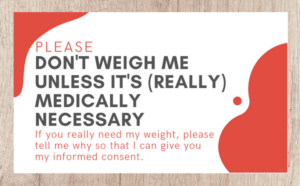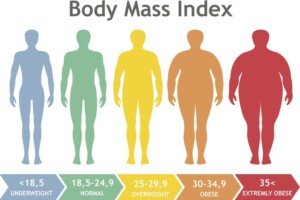
There’s a growing movement of women refusing to get weighed at doctors’ offices.
There are multiple reasons why nurses weigh every patient, regardless of their size.
There’s increasing backlash from women who question the purpose of getting weighed before the physician sees them in the office.
Many women dread this practice, and some go as far as calling it fat shaming (even though all patients, including thin men, get weighed at some doctors’ offices).
If you find this backlash difficult to believe, here is some proof.
The image at the top of this article is an actual card (the size of a credit card) that can be ordered from a site that begins with:
Free “Don’t Weigh Me” Cards
It’s very stressful that every time we go to the doctor, we get weighed. This stress is part of the health damage caused by weight stigma.
In addition, there are several online articles that encourage women to refuse the weigh-in at a doctor’s office. This was unheard of a few generations, even one generation, ago.
Alan Roberts is a personal trainer who specializes in helping morbidly obese people safely lose weight.
In one of his YouTube videos he makes a very interesting observation:
That many overweight body-positive influencers – who claim to love their body and that they’re healthy – actually protest the idea of getting weighed at doctor visits.
Roberts points out that if they really are body positive and embrace their size, they wouldn’t refuse to be weighed.
In fact, in alignment with their body-love message, they should warmly accept being weighed and even view the number.
However, there’s nothing wrong with refusing to view the number on the scale. People usually know when they’ve gained weight.
The problem is when the patient refuses to get weighed by the nurse in the first place.
Though there’s no reason for a weigh-in at a dermatologist’s office (yes, the clinic I get mole-mapping from used to do this) or at other offices where the diagnostics, diagnosis and treatment would have nothing to do with body weight — we need to realize that there are other fields of medicine for which tracking body weight could be very relevant to the patient’s medical history, and/or suggestive of a new-onset condition.
Why Weight Is So Important
“Most people have a good idea of what they weigh, but some people have no idea,” says Dr. David Beatty, MD, a retired general practitioner with 30+ years of experience and an instructor of general medicine for 20 years.
“Occasionally the discrepancy between what a person thinks they weigh and what they actually weigh is enormous.
“Some people are out by 20, 30 or even 40 pounds. This is particularly true in the very obese patients.”
A bathroom scale may have a weight limit. “So those with a very high BMI may not be able to easily weigh themselves at home,” continues Dr. Beatty.
“Obviously, those with a very high BMI are the most in need of a weight loss program, to reduce their risk of associated medical problems.
“Weighing the patient is the first step to addressing being overweight or underweight.”

MarShot/Shutterstock.com
Why Nurses Record Your Weight
“By recording serial weights, the trend can be discussed and adjustments made to dietary regimes,” says Dr. Beatty.
“It’s easier to make small dietary changes when a person’s BMI is 27 (the ideal being 20-24.9) than to deal with a BMI of 37 or even 47. A stitch in time saves nine.’
“If someone presents with a symptom of weight gain or weight loss, it’s useful to have previous weight to compare with.
“It quantifies the weight change, and sometimes it becomes clear there has been no change at all.”
If unexplained or unintentional weight gain is discovered with serial weigh-ins, this raises a red flag.
It often means fluid retention. This can be the result of excess sodium intake, or a problem with the heart, liver or kidneys.
It can also mean ovarian cancer, since advanced disease can cause fluid buildup in the abdomen. So can lymphoma.
Weight gain for no apparent reason can also suggest underactive thyroid or side effects from a medication.
Taking weights at a doctor’s office is important also because the dose of some medications is determined by body weight.
Everyone Gets Weighed

“Those who are underweight should also be addressed,” says Dr. Beatty.
“With a BMI below 17, anorexia nervosa should be considered as well as other medical causes of low weight.”
Unintentional or unexplained weight loss can mean adrenal insufficiency, overactive thyroid, celiac disease, ulcer, diabetes or cancer, to name a few.
Unexplained weight loss can occur in an obese patient as much as it can in a patient with a normal body mass index.
Weighing Kids at Doctor Appointments
Some body positive influencers go as far as criticizing the practice of nurses weighing children, claiming that this can cause psychological harm.
“In children it’s particularly important to have a series of weights taken over the years,” says Dr. Beatty.
“Their weight and height should be plotted on a centile chart.
“If the child is dropping down the centile chart, the doctor needs to look for causes for the failure to thrive.”
There is absolutely no research that suggests, or investigative evidence that supports the idea, that merely being weighed at a doctor’s office can cause damage to a child’s self-esteem or make them more prone to developing any kind of eating disorder or other destructive behavior.
What influences children far more is how their parents interact with them and what their parents say to them.
Can knowing your body weight be detrimental to well-being?

Shutterstock/Dmytro Zinkevych
According to Melissa Fabello, it can. She wrote an article for Self titled, “I Don’t Get Weighed at the Doctor’s Office—and You Don’t Have to, Either.”
Fabello then quotes a comment on her Instagram account, “Being weighed at the doctor is so triggering to my food and body issues!”
Ironically, Fabello says she’s thin. But a thin woman can have unintentional weight gain – or loss – due to a medical situation.
It’s fair to note that those who are recovering from anorexia nervosa or bulimia nervosa may find the weigh-ins upsetting.
But many women who are on edge about getting weighed at a doctor’s office fall under the category of the typical, overweight woman who subsists on excess portions of SAD: standard American diet. Or, to put it another way, SWD: standard Western diet.
It’s one thing to close your eyes when you’re being weighed. There’s nothing wrong with this. At least your doctor will have a record of your weight. You don’t have to know the number, but your health care provider should.
However, things rise to a whole new level when patients deny their medical provider this valuable piece of data.
As mentioned previously, weight tracking for certain branches of medicine would not be meaningful. But for many branches, it is.
For instance, if a patient has developed snoring over the past few months, an ear/nose/throat doctor would be interested in knowing if there’s been any weight gain recently.
That’s because weight gain can affect throat tissue and lead to snoring and possibly obstructive sleep apnea.
If an overweight woman refuses to be weighed, does she already have a mental health issue that needs to be addressed?
The campaign to refuse weigh-ins (such as Fabello’s) has definitely put this idea into the heads of many suggestible women.
It’s a questionable practice, promotes denying the dangers of obesity, and it can allow a serious medical condition, such as peripheral edema from early chronic heart failure, to go unnoticed.

 Dr. Beatty has worked in primary medicine, surgery, accident and emergency, OBGYN, pediatrics and chronic disease management. He is the Doctor of Medicine for
Dr. Beatty has worked in primary medicine, surgery, accident and emergency, OBGYN, pediatrics and chronic disease management. He is the Doctor of Medicine for 
























